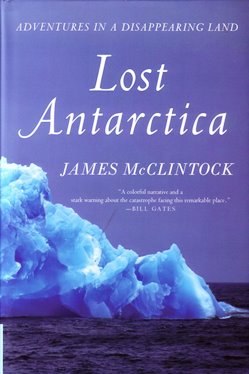 This book describes some of the changes that have occurred in Antarctica over the last 50 years or so. Written for a popular audience by the Endowed University Professor of Polar and Marine Biology, University of Alabama at Birmingham, it is based on research and experiences of the author, his colleagues and collaborators in Antarctic marine chemical ecology and, more recently, studies of the impacts of a rapidly changing climate on marine plants, animals and communities of the Antarctic Peninsula. The author has made 14 research visits to Antarctica – to the Kerguelen Islands, 9 consecutive expeditions to McMurdo Sound and latterly to the US Palmer Station and the Antarctic Peninsula.
This book describes some of the changes that have occurred in Antarctica over the last 50 years or so. Written for a popular audience by the Endowed University Professor of Polar and Marine Biology, University of Alabama at Birmingham, it is based on research and experiences of the author, his colleagues and collaborators in Antarctic marine chemical ecology and, more recently, studies of the impacts of a rapidly changing climate on marine plants, animals and communities of the Antarctic Peninsula. The author has made 14 research visits to Antarctica – to the Kerguelen Islands, 9 consecutive expeditions to McMurdo Sound and latterly to the US Palmer Station and the Antarctic Peninsula.
Descriptions of fieldwork events and the wildlife give a fascinating insight into the life of an Antarctic scientist and will bring back memories for those who have been lucky enough to visit or work in Antarctica. Interspersed with the main message of the book about the effects of climate change on Antarctica, which has notes referencing both journal and popular press articles, they provide an excellent leavening to the science.
Eight chapters cover different aspects starting with a broad introduction to Antarctic research, followed by the importance of ice and how it is being affected. Since the opening of Drake Passage between Antarctica and South America 30-40 million years ago, the Antarctic Circumpolar Current has isolated the continent and played an important role in regulating global climate. However, this has migrated southwards since the 1950s and dramatic increases in temperature, particularly in the Antarctic Peninsula, have led to the break-up of ice shelves and accelerated flow of glaciers into the sea. Then come planktonic and sea-floor communities, ocean acidification, the invasion of king crabs, introducing a crushing predator to Antarctic seas, and the decline of Adélie penguins and southward march of sub-Antarctic species.
The book presents a wake-up call, warning that, by 2100, there will be no annual sea ice in the central and northern parts of the Western Antarctic Peninsula, no Adélie penguins, krill replaced by far less nutritious salps in the plankton, with sea-floor organisms threatened by rising temperatures, ocean acidification and invading king crabs, leading to the loss of defensive chemicals that kill pathogens and ward off predators, including some with biomedical potential. The importance of Antarctica in discoveries related to climate change and atmospheric science is emphasised. Ice cores going back 720,000 years show cyclic fluctuation in CO2 content peaking at 280-300ppm and ozone depletion caused by CFCs was discovered here. This may provide an element of hope since the 1987 Montreal protocol has successfully stopped the depletion and ozone levels in the stratosphere are expected to return to 1980 levels by 2045 to 2060 – an exemplar of international cooperation for action on climate change.
I thoroughly enjoyed this fascinating book with its mixture of popular anecdotes and thorough well referenced science.
Reviewed by David Brook
LOST ANTARCTICA: ADVENTURES IN A DISAPPEARING LAND by James McClintock, 2012. New York, Palgrave Macmillan, 231pp. ISBN 978-0-230-11245-2. $26.00/$30.00Can.